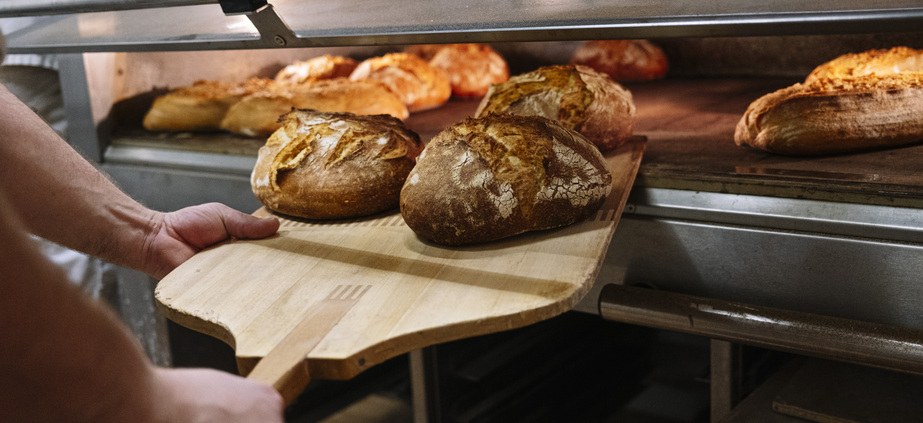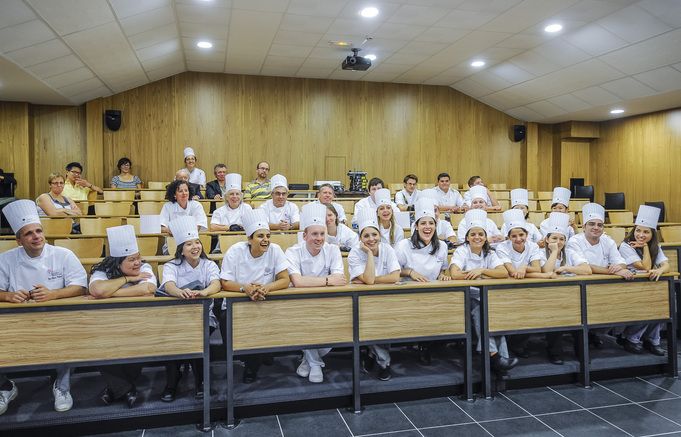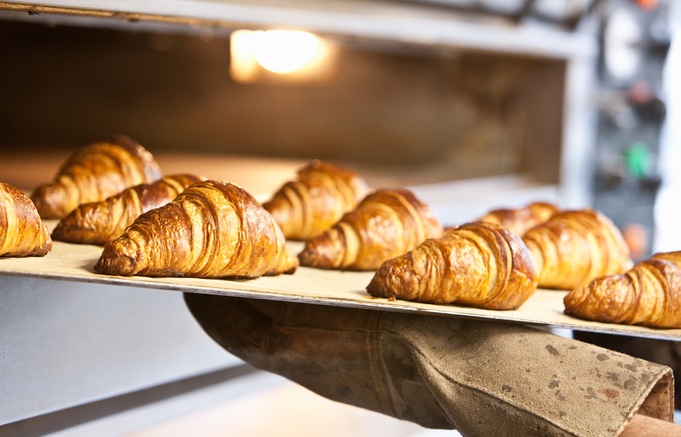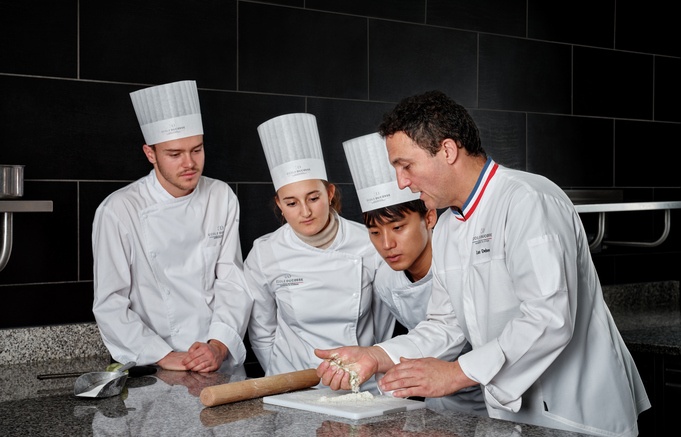How to become a baker

Becoming a baker is a dream job for many people as it's appealing on so many levels. Not only do you get to make delicious food and work in an exciting and fast-paced field, you also get to be creative and develop new recipes. This makes being a baker one of the most popular roles in the culinary arts. There's also a growing demand for skilled bakers in all areas of the industry, so it's a great career path with loads of opportunities.
In this article, we'll discuss everything you need to know to become a baker. We'll look at the different baking techniques, skills and qualifications you can gain to improve your chances of having a successful baking career and the different career options you have.
Understanding the role of a baker
A baker is, quite simply, someone who designs and prepares baked goods in the food and beverage industry. This can include making all kinds of items, such as cakes, biscuits, pastries, bread and pies. Bakers are trained professionals with a background in the field of culinary arts. There's also a lot of potential for advancement or specialization in the bakery field. For example, you could become a commercial baker, artisan baker or work inside a restaurant.
Types of bakers
There are a lot of different types of bakers who all work in discrete environments and have differing roles. Some of the main different bakery careers you can look into include:
- Bread bakers specialize in bread, sourdough, rolls, muffins and more. They may work in a kitchen or a commercial bakery or supply baked goods for restaurants and hotels.
- Pastry chefs focus on desserts, cakes, biscuits and pastries. The main difference between a baker and pastry chef is the amount of training required, because being a pastry chef requires mastery of specialized techniques.
- Head bakers oversee all baking and pastry arts in a kitchen or bakery.
- Chocolatiers focus on desserts and fine chocolate. Read more about how to become a chocolatier in our blog on the subject.
- Patisserie experts specialize in fine French baking and dessert making.
What are the benefits of being a baker?
Being a baker can be a great career because:
- You get to be creative when working on new recipes, cake decorations, and ideas
- It's a fast-paced industry
- You get to work with your hands on a tangible product
- There's plenty of scope for advancement
- It can help you indulge your love of food and passion for baking
Education and training

If you want to become a baker, one of the best routes is to go to a culinary school and get a culinary arts degree. You can also look at learning on the job through a baking apprenticeship, but this will likely not give you the same breadth of education a culinary school can provide. Alternatively, it's possible to become a baker by working your way up from entry-level roles, but this can take many years.
What degree do you need to be a baker?
There are many different professional baking courses you can look at to help you get into the baking industry. Make sure you find a course that covers all the skills you'll need for your ideal bakery career. For example, if you want to start your own bakery one day, you should find a course that includes bakery business management as well as cooking skills. Finding a French pastry school that offers professional internships will also allow you to make the most of expert training and real-world experience.
Exquisite pastry training
Our definitive pastry course combines advanced techniques, insider knowledge and internships so you can master the art of baking and the practical side of restaurant management.
How long does it take to become a professional baker?
Once you finish your studies and get practical baking certifications, you'll be ready to work as a professional baker. This can take a few years, depending on the training you want to complete. Of course, you can always keep improving with baking workshops and classes or further education.
Essential baking techniques
As part of your training, you'll learn all the essential baking skills. If you want to improve your career prospects as a baker, you need to make sure you have mastered all of these skills fully.
Preparing the foundation
For any career in baking, whether it's bread making, cake decorating or making desserts, you'll need basic skills such as:
- Understanding ingredients and their functions so you don't just have to follow recipes
- Competence in flavor selection
- Measuring and weighing accurately
- Common baking measurements and conversions
- Mixing and kneading techniques
The art of baking
There are also some more advanced techniques you will need to learn, such as:
- Understanding fermentation and yeast
- Working with different types of dough
- Recipe development to make new and exciting baked goods
Baking methods and equipment

Westend61/Westend61 via Getty images
On top of this, you'll need to be familiar with how to bake in a professional kitchen, which means knowing about:
- A range of different baking methods, including rising, resting and knocking back
- The common baking tools and equipment as well as their uses
- Food safety and hygiene in baking
- Oven temperatures and timing
Developing specialized baking skills
If you want to become a more specialized baker, such as a pastry chef, you'll also need to learn more refined skills. These will help you qualify for some of the more advanced careers in the field. Mastering them means you can specialize in a field that interests you while aiming for higher salaries and more responsibility.
Pastry and desserts
- To develop advanced pastry skills, you need to know about:
- Types of pastry making and pastry
- Techniques for creating cakes, pies and tarts
- Baking for special occasions, such as wedding cakes and birthday cakes
- Decorating and presentation skills
Bread and artisan baking
There are also plenty of artisanal baking skills you can pick up if you want to run a bakery. These include:
- Basics of bread making
- Different types of bread and the techniques for making them
- Artisanal baking and sourdough bread
- Vegan baking
- Gluten-free baking
Gaining experience and building a portfolio
It's always a good idea to get practical hands-on experience if you want to become a baker. The main ways to do this are through volunteering, internships and entry-level positions. All these will help you learn what it's like to work in a professional kitchen, which helps when you get your first bakery job as you will be ready to hit the ground running.
It's also important to focus on developing a portfolio of baked goods to show off your skills. You can often do this during your studies or your work experience, so once you're done, you'll be ready to start your career. Your portfolio should show a range of different techniques, including uncommon and difficult-to-master skills. You should also try to demonstrate a mix of results, encompassing where you've stuck to classic, traditional baking and items where you've had creative input. This could be in recipe development, food presentation, or menu planning. Entering baking competitions can also be great for your portfolio.
Nurturing entrepreneurial skills

If you want to start your own bakery business, you will also need to nurture certain skills, such as business planning and financial management. You'll also need to learn marketing and customer service strategies and develop a viable idea for a new enterprise. There are many different types of bakery businesses you could look at, such as:
- A bakery that serves walk-in customers
- A café
- A production facility making items for restaurants or cafés
- A food truck or stall.
Continuing education and growth
As we've already mentioned, there are many benefits to continuing your development as a baker. It's important to stay updated with industry trends and innovations to make sure your baked goods are the best they can be. It's also worth attending workshops, seminars and conferences, all of which can help you learn more about the industry, hone your business skills and help you network with other culinary professionals. You might also want to consider pursuing advanced culinary education, no matter what stage you're at.
Intensive courses in French patisserie
With world-class tutoring and a professional internship, our diploma is an exceptional launch pad to help you start or advance your career in the fine art of French baking.
What are the career prospects for bakers?
There's a wide range of different careers in the culinary world you can look at as a baker. You could advance towards being a head baker or head pastry chef in a fine dining restaurant. You could also look at opening your own bakery or food business if you want to be an entrepreneur and see your own vision become a reality. Or, you could specialize in a specific area of the baking arts such as patisserie, sourdough bread, or viennoiserie (breakfast pastries in the Viennese style).
Becoming a baker: conclusion
Becoming a baker is an exciting career path if you want to combine your love of food with a rewarding and creative career. If you want to start a career as a baker, the best first step is getting a well-respected baking qualification from a culinary school. This will help you learn all the skills you need. It's also important to get experience in a real-world setting, such as through entry-level roles or via internships. With the right training and skills behind you, a bakery career can develop into a rewarding life choice.
Photo credits
Main image:
Westend61/Westend61 via Getty images


